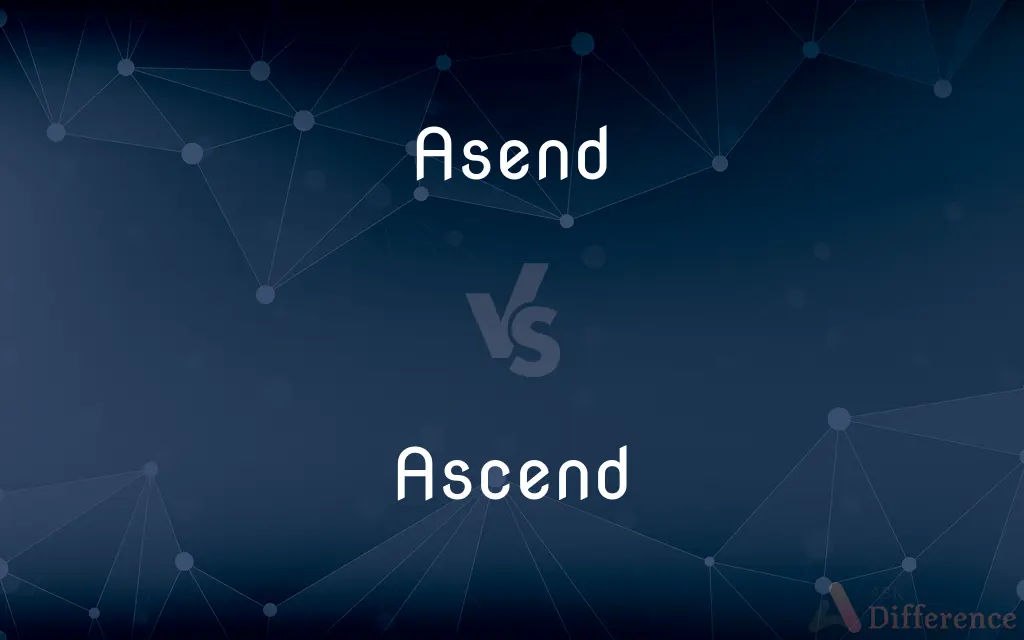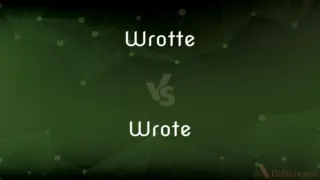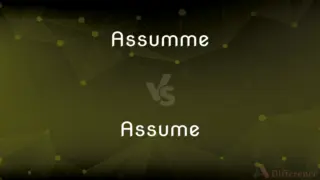Asend vs. Ascend — Which is Correct Spelling?
By Tayyaba Rehman — Updated on March 29, 2024
"Asend" is an incorrect spelling, while "Ascend" is the correct spelling, denoting a rise or climb.

Table of Contents
Which is correct: Asend or Ascend
How to spell Ascend?

Asend
Incorrect Spelling

Ascend
Correct Spelling
ADVERTISEMENT
Key Differences
"End"ing in height: "ascend."
Recall "descend," its opposite. It’s spelled with “sc,” so is “ascend.”
Link it with the word "ascension," the act of rising or ascending.
Always Start Climbing: "Ascend" starts with "Asc" which hints at rising or climbing.
Think of "ascent" which refers to a climb; it also uses "sc."
ADVERTISEMENT
How Do You Spell Ascend Correctly?
Incorrect: The eagle began to asend, circling higher above the trees.
Correct: The eagle began to ascend, circling higher above the trees.
Incorrect: He tried to asend the mountain before noon.
Correct: He tried to ascend the mountain before noon.
Incorrect: She aims to asend the corporate ladder within five years.
Correct: She aims to ascend the corporate ladder within five years.
Incorrect: The stairs were steep, but we managed to asend quickly.
Correct: The stairs were steep, but we managed to ascend quickly.
Incorrect: The balloon started to asend rapidly into the sky.
Correct: The balloon started to ascend rapidly into the sky.
Ascend Definitions
To move upward; climb.
The climber began to ascend the mountain.
To slope or lead upward.
The path ascends steeply at first.
To go or move upward; rise
The balloon ascended into the clouds.
To rise; to become higher, more noble, etc.
To go to a higher position in a hierarchy.
After years of hard work, she ascended to the position of CEO.
In a spiritual context, to rise to a higher or more powerful state.
It's believed that saints ascend to heaven.
In music, to move to a higher pitch.
The notes ascend gracefully in the melody.
To slope upward
The trail ascends to an outcrop overlooking the valley.
To rise from a lower level or station; advance
Ascended from poverty to great wealth.
Ascend to the throne.
To go back in time or upward in genealogical succession.
To move upward upon or along; climb
Ascended the mountain.
To slope upward toward or along
The road ascends the ridge.
To succeed to; occupy
Ascended the throne upon the death of her father.
(intransitive) To move upward, to fly, to soar.
He ascended to heaven upon a cloud.
(intransitive) To slope in an upward direction.
(transitive) To go up.
You ascend the stairs and take a right.
(transitive) To succeed.
She ascended the throne when her mother abdicated.
To trace, search or go backwards temporally (e.g., through records, genealogies, routes, etc.).
Our inquiries ascend to the remotest antiquity.
To become higher in pitch.
To lose one's virginity, especially of a man through unpaid and consensual sexual intercourse with a woman.
To move upward; to mount; to go up; to rise; - opposed to descend.
Higher yet that star ascends.
I ascend unto my father and your father.
The smoke of it ascended up to heaven.
To rise, in a figurative sense; to proceed from an inferior to a superior degree, from mean to noble objects, from particulars to generals, from modern to ancient times, from one note to another more acute, etc.; as, our inquiries ascend to the remotest antiquity; to ascend to our first progenitor.
To go or move upward upon or along; to climb; to mount; to go up the top of; as, to ascend a hill, a ladder, a tree, a river, a throne.
Travel up,
We ascended the mountain
Go up a ladder
The mountaineers slowly ascended the steep slope
Go back in order of genealogical succession;
Inheritance may not ascend linearly
Become king or queen;
She ascended to the throne after the King's death
Go along towards (a river's) source;
The boat ascended the Delaware
Slope upwards;
The path ascended to the top of the hill
Come up, of celestial bodies;
The sun also rises
The sun uprising sees the dusk night fled...
Jupiter ascends
Ascend Meaning in a Sentence
As the plane began to ascend, the city below looked increasingly small.
To ascend the throne, the prince had to follow centuries-old traditions.
The hot air balloon continued to ascend, offering breathtaking views.
The hikers began their journey to ascend the highest peak.
The new elevator made it easy to ascend the skyscraper quickly.
The climbers used ropes and gear to safely ascend the vertical cliff.
She worked hard to ascend from an entry-level position to manager.
During meditation, he felt as if his spirit could ascend to higher realms.
Legends tell of ancient heroes who could ascend to the heavens.
To ascend in your career, networking and continuous learning are essential.
Her ability to solve complex problems helped her quickly ascend within the company.
As the curtain rose, the singer prepared to ascend the stage.
As we ascend in elevation, we'll need to adjust to the thinner air.
The company has been on an ascendancy, with profits continuing to ascend.
Young athletes dream of the day they will ascend to professional leagues.
The spacecraft is designed to ascend beyond Earth's atmosphere.
The leader's inspiring speech encouraged people to ascend beyond their limitations.
The path to ascend the hill was winding and steep.
The temperature began to drop as we continued to ascend the mountain.
To ascend these ancient ruins without damaging them requires great care.
The ancient stairway was carved into the rock, allowing pilgrims to ascend to the temple.
In many video games, players must defeat challenges to ascend to the next level.
The project's success helped him ascend to a position of greater responsibility.
The pilot announced that we would soon ascend to cruising altitude.
Ascend Idioms & Phrases
Ascend the ranks
To move up through the levels of hierarchy in an organization.
He ascended the ranks quickly, thanks to his dedication and hard work.
Ascend to power
To rise to a position of leadership or high status.
The young ruler ascended to power after the king's passing.
Ascend the throne
To become king or queen.
Upon her grandmother's abdication, she ascended the throne as the new queen.
Ascend to greatness
To achieve great success or reach a high level of excellence.
Through relentless effort and innovation, the entrepreneur ascended to greatness in the tech industry.
Common Curiosities
Which vowel is used before Ascend?
The vowel "a" is used before "Ascend."
What is the pronunciation of Ascend?
It is pronounced as /əˈsɛnd/.
What is the singular form of Ascend?
"Ascend" is a verb and doesn't have a singular form.
What is the root word of Ascend?
The root word is Latin "ascendere."
What is the plural form of Ascend?
Verbs don't have plural forms, so "Ascend" remains "Ascend."
What is the verb form of Ascend?
"Ascend" itself is the verb form.
Is Ascend an abstract noun?
No, "Ascend" is not an abstract noun.
Which preposition is used with Ascend?
"To" as in "ascend to the throne."
Why is it called Ascend?
It's called "Ascend" from Latin "ascendere" meaning "to climb, rise."
Which conjunction is used with Ascend?
Conjunction usage varies, but "and" can be used as in "ascend and see the view."
Is Ascend an adverb?
No, "Ascend" is not an adverb.
Is Ascend a countable noun?
"Ascend" is a verb and not a noun.
Is Ascend a vowel or consonant?
"Ascend" is a word composed of both vowels and consonants.
Is Ascend a collective noun?
No, "Ascend" is not a collective noun.
How many syllables are in Ascend?
There are two syllables in "Ascend."
Which determiner is used with Ascend?
Determiners like "the" can be used based on context.
Which article is used with Ascend?
Depending on context, "the" can be used, as in "the ascend of the mountain."
How do we divide Ascend into syllables?
As-cend.
What is another term for Ascend?
Another term for "Ascend" is "rise."
Is the word Ascend a Gerund?
No, but "ascending" is its gerund form.
What is the first form of Ascend?
The first form is "Ascend."
Is Ascend a noun or adjective?
"Ascend" is a verb.
Is the word “Ascend” a Direct object or an Indirect object?
"Ascend" is a verb. Its action can have a direct object, like "stairs" in "ascend the stairs."
What is a stressed syllable in Ascend?
The second syllable "cend" is stressed.
What is the opposite of Ascend?
The opposite of "Ascend" is "descend."
What is the third form of Ascend?
The third form is "Ascended."
How is Ascend used in a sentence?
"The birds ascend into the sky at dawn."
Is Ascend a negative or positive word?
It's neutral; context determines its connotation.
Is the Ascend term a metaphor?
By itself, no. But it can be used metaphorically, e.g., "ascend to power."
Is the word Ascend imperative?
It can be used in the imperative form, as in "Ascend the stairs!"
What part of speech is Ascend?
"Ascend" is a verb.
What is the second form of Ascend?
The second form is "Ascended."
Share Your Discovery

Previous Comparison
Wrotte vs. Wrote
Next Comparison
Assumme vs. AssumeAuthor Spotlight
Written by
Tayyaba RehmanTayyaba Rehman is a distinguished writer, currently serving as a primary contributor to askdifference.com. As a researcher in semantics and etymology, Tayyaba's passion for the complexity of languages and their distinctions has found a perfect home on the platform. Tayyaba delves into the intricacies of language, distinguishing between commonly confused words and phrases, thereby providing clarity for readers worldwide.














































